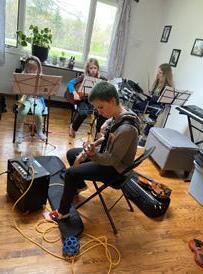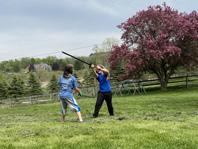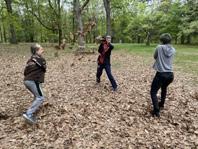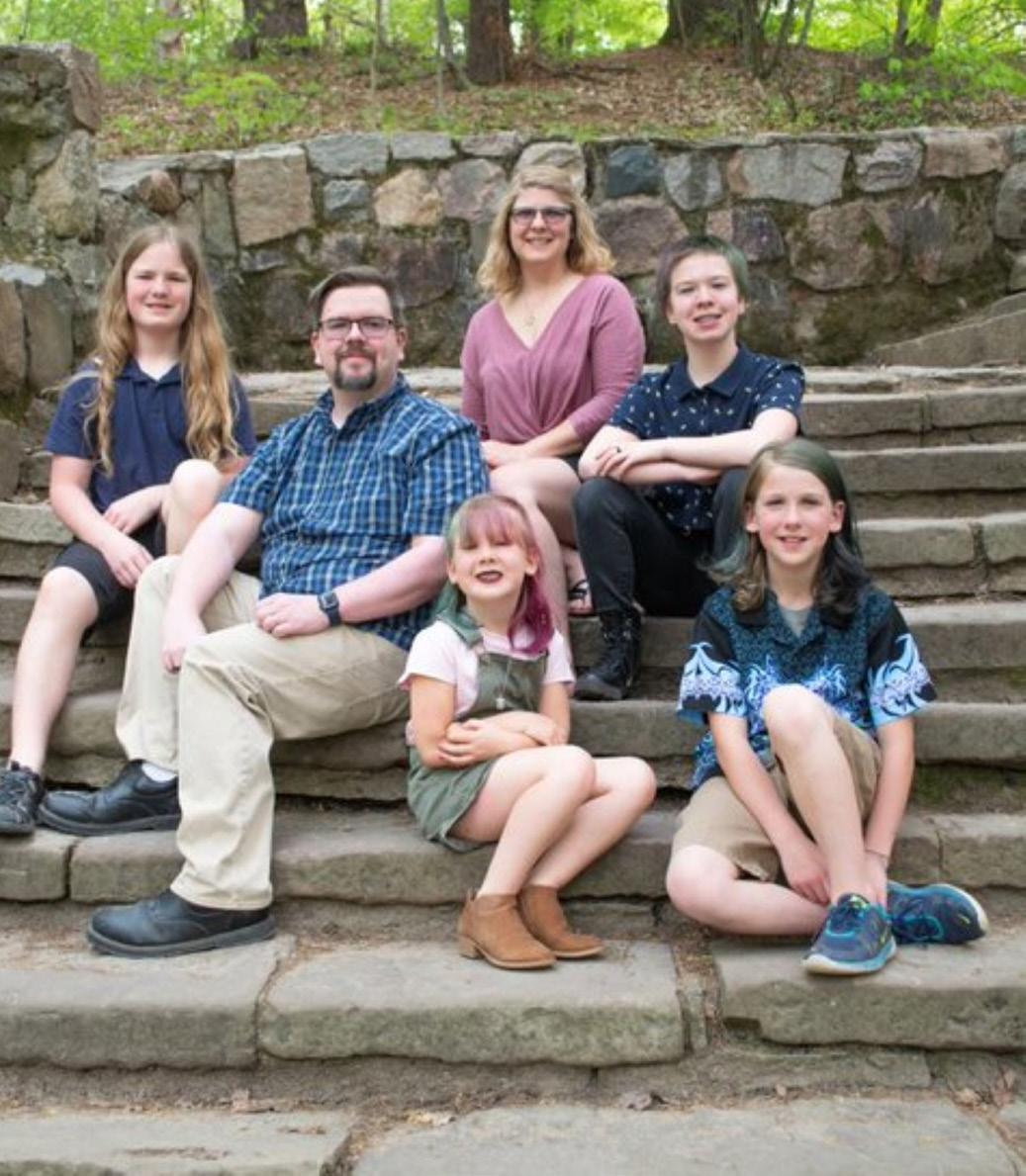
13 minute read
MEET THE ROGERS FAMILY
LEIGHTON, KENDRA, REMY, LIAM, MCKEON AND KAELYN ROGERS
By Kendra Rogers-Editor-in-Chief
We are a family of six living in rural MI south of Flint. We are Dad (Leighton), Mom (Kendra), sons (Remy-16, Liam13, McKeon-11), daughter (Kaelyn-7), and several animals! In the last six years, we have volunteered with OATS, a therapeutic horseback riding facility nearby. We feed the animals and help with classes sometimes. The kids all play instruments as part of their homeschool day. While they are high achievers, working several grade levels ahead of their age grades, life, and school aren’t all roses!
REMY:
16 years ago, when we realized our first baby was on the way, we started panicking…dreaming of what life would be like. We had no idea what was really in store! Remy seemed fairly typical for a long time, but around 18 months, he was able to have complex conversations with anyone who would listen. He then taught himself to read by age three. We knew that traditional school would be a fight for accommodations and acceleration, so we chose to homeschool. I expected him to slow down when the content got more challenging, but he continued to soar through multiple grade levels each year, entering high school-level content by age 10. We followed his lead and explored deeper and deeper into the content matter. He began playing violin at age five, too. He chose his instrument, and we began lessons. He occasionally encountered challenges that rendered him frustrated and nearly defeated. He always recovered and climbed the wall to prevail. Now, he is in a community orchestra playing violin. He also decided to learn viola, electric bass, ukulele, and can play piano. Largely, he plays by ear but is adept at reading music, too. Though he is almost 16, he doesn’t know what he wants as a career, whether he wants to attend college, or what tomorrow holds. We are rolling with those feelings and waiting for him to tell us his next set of needs or desires for his own future. He has always vacillated between career and life goals, and we had a feeling he would be late to choose. At only 16, we don’t think he is late at deciding what he will do for the next 60 or more years!
LIAM:
By the time Remy was a bit over two, we had welcomed our second son, Liam, six weeks early. Thankfully, he was strong and healthy and didn’t have a long hospital stay or many interventions. We expected Liam to follow his big brother’s developmental steps, but he did not. Instead, Liam was largely non-verbal until age four. What language he did have was challenging to understand and developing strangely. He said the ends of words rather than the beginnings— “us ime” meant “Optimus Prime”. He grew incredibly angry when we didn’t know what he wanted from us. We used sign language to help, and he learned over 300 signs with us so he could communicate better. When others didn’t know his signs, meltdowns lasted for hours. At one, Liam lined up his toys in groupings by size, color, and type. He also “counted” them by grunting and pointing at each toy. We thought it was adorable and quirky. Others suggested he may have autism, but we ignored the signs. His refusal to change tasks, compromise, and touch certain things should have been strong clues. His multiple hours-long daily meltdowns should have tipped us off that there was something more to this precocious child. Though he couldn’t tell us until he was four, we are certain he could also read early. He was hyperlexic. When he began manipulating numbers, it was clear that dyscalculia may be a challenge. Writing exercises showed us dysgraphia. Liam’s needs again showed us that homeschooling was right for him. I was able to accommodate his needs, cater the school day to include plenty of transition time, and ensure he had support for all his challenges. We created a calm-down space where he could be angry safely. We provided comfortable, safe seating, focus items, and fidgets. He even participated in creating the space with things he felt happy about. We let the meltdowns happen. We directed him to his space and encouraged the use of any items he felt good about. These meltdowns did not end with the toddler years of challenging communication but continued into childhood. At age seven, we had an official diagnosis, of autism and profound giftedness. This diagnosis allowed us to research more clearly instead of pulling at straws trying to figure out how to help Liam. We started working with OATS shortly after this diagnosis, too. His needs for routine and predictability were well met at this beloved farm. Until just a few weeks ago, he always used the same lead rope. The routine, though different from when we started, has taken on a new normal and the expectations keep Liam grounded. Though Liam has greatly improved in his ability to adapt to change and exist without explicit plans, we still see glimmers of difficulty when plans change in major ways. When this happens, though, he is much more
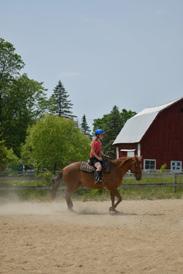
logical and able to understand the need for change. He is able to express why he is upset and choose activities (usually reading) to help him calm. This development, while very welcome, is not without many years of tears—mine and his— yelling, frustration, feelings of hopelessness, and tireless work to teach Liam and help him name and moderate his emotions. It is because of our struggles with Liam that I chose to write “Growing Exceptional Seedlings: Companionship for Parents of Neurodivergent Kids”. I started reading parenting books when my children were more than I anticipated but none of them ever spoke to our challenges and none of the tips and tricks worked for my precocious humans.
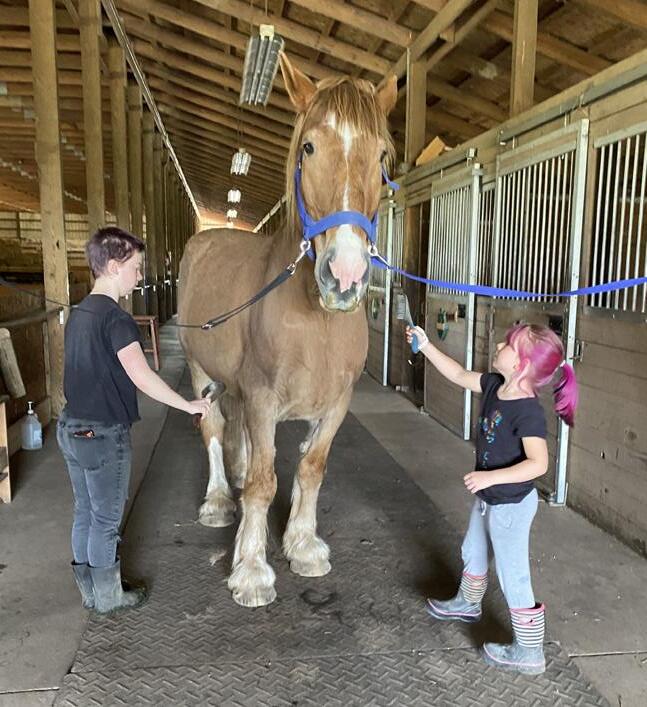
MCKEON:
Shortly after Liam turned two, we had baby three, McKeon. He was no typical infant. He rolled at three weeks and crawled at five months despite barely sleeping due to intestinal and skin discomfort from multiple severe allergies. He slept 45-minute stretches for a total of four hours a night for the entire first year. We had him at specialists from six months old to determine the cause of his difficulties. Despite allergies and limited food options, he pulled up to stand in the hospital crib less than 24 hours after a procedure during which he was under general anesthesia. The precocious moving of a baby with many food allergies along with two toddlers was an added challenge. I began to suspect ADHD as well at around age two. He routinely attacked his brothers for no apparent reason. I regularly had to rescue siblings caught in corners with his fists flying. He was also a biter, though generally, the biting was from frustration. He required a lot more hands-on parenting which was especially challenging while sleep deprived. McKeon’s intensity was different than Liam’s. When Liam was upset, he simply screamed for hours. When McKeon was upset, he attacked whatever moved near him.
We began what we term “tomato staking”. Just as a tomato plant grows best when supported by a stake, McKeon responded best to direction and support in the moment of his frustration. He was never permitted out of sight of a parent. I was home alone most of the waking hours of the day with three of my own kids and sometimes, kids I babysat for extra money to pay for specialists and special food. This meant the onus was on me to keep McKeon and all the others safe. I took him to the bathroom with me, I showered and ate while he was napping—if he napped. The other kids got less attention so I could be on top of McKeon’s behavior. We remained this way for several years, but McKeon gained control of his emotions and reactions to them. Instead of biting and hitting, McKeon began to growl and clench his fists to demonstrate frustration. We would move him and sit with him to help him calm down, name his emotions, and discuss a plan of a healthy way to describe them and ask for his wants to be met. He was a tiny boy with big feelings and needs that were difficult to express. In addition to his strong feelings about life in general, McKeon grew anxious about food and his surroundings. Through reassurance, and understanding, he has calmed a great deal. We did have him assessed a few years ago for trauma-related obsessive-compulsive disorder (OCD) as well. Thankfully, his hand-washing symptoms abated with a changed environment where he felt safer. He is now 11 and mostly great at expressing himself calmly and managing his allergies and other diagnoses including a few more health-related ones making Covid-19 that much more concerning. However, there are times he struggles. In those times, we direct him to his bed to breathe, scream, and relax then come talk calmly. He also has several tasks he may choose from when he feels his body is vibrating too much. We decided on these options together and with his input, so he is mostly happy about them, too.
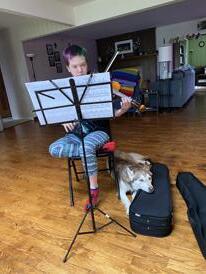
KAEYLN:
Our last, but not least. Our little Kaelyn. She was a highly anticipated baby born after several miscarriages. She is over four years younger than McKeon. We were finished with diapers, naps, and night waking… then Kaelyn turned us on our heads. She was a calm baby who only cried when she was hurt—physically or emotionally. She was just five months old when she spoke her first word (“Mom”) and eight months for her first sentence—”MMmmm, more bacon!”. We thought…oh great, another one… meh, we got this! She had a different set of twists for us, though. Instead of just not sleeping through the night, she also quit naps at 20 months. And potty trained at 22 months. She was just one when we started volunteering at OATS, and from day one, she insisted on holding the lead ropes and walking the horses while I carried her in a baby carrier around the 40-acre facility. She rode her first horse (with me) at two and never looked back. This little force has let nothing stop her. She forged friendships with animals and people virtually throughout the Covid-19 pandemic even though she was just turning four when it started. Later that year, she began playing cornet, a small, trumpet-like brass instrument, via virtual lessons. Like her brothers, she is grade levels ahead of her age grade and is nearing the completion of third grade at just over seven years old. While she seems like a typical gifted kid on paper, she has introduced an entirely new kind of intensity to our lives! Or, maybe, we just forgot what the others were like at her age. Aside from naps and potty training, she has surpassed our expectations for playing an instrument, her passions exceed those of her siblings at this age, and she is easily offended when argued with. She KNOWS she is right and even proving to her that others are too does not dissuade her from her strongly held beliefs. She has been able to “do it self” since she was one and put on socks using her feet! She innovates life so she can be independent. Yet, she is ritualized with her bedtime routine and whenever someone leaves the house. Though we tell her nightly, she still announces when she begins to brush her teeth, and the same phrases must be repeated verbatim every night when saying “goodnight”. Without these rituals, she is lost and unsure of the next steps. As they do not interfere with general life and are relegated to specific situations, we have not investigated any twice-exceptionalities with her, yet.
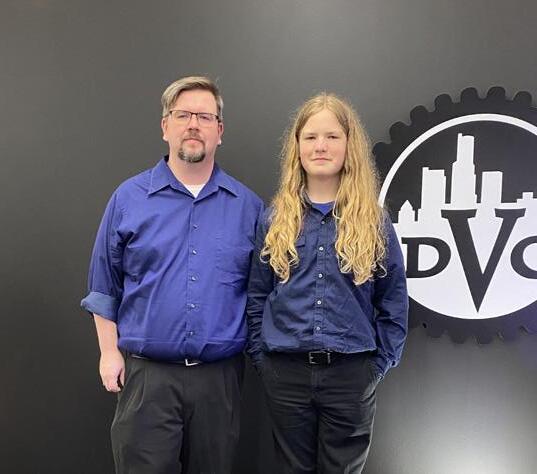
LEIGHTON AND KENDRA:
Leighton was diagnosed with autism and ADHD in 2020. Though we assumed he was gifted, it was also confirmed at this time. He struggled through high school and was excused from two colleges in his early adult years. Once he found his passion in information technology (IT) and a company hired him as a technician, he was able to embrace his abilities and earn from them. Though he has moved jobs several times, he has remained in the IT field for over 20 years. In 2021, he decided to use the Michigan Reconnect grant and return to school to earn his associate’s degree. He is just a few classes from doing so.
I, Kendra, was identified as gifted as a child. As an adult making decisions for my own neurodiverse children, I recognize my parents did what they knew was best with the information and resources they had at the time. I am doing the same, but I have many more resources. I was in counseling for anger difficulties similar to those McKeon experienced. However, my counseling was not effective. As an adult, I have been able to learn about myself and my needs more and adjust to dispel my anger in a healthy manner…mostly. In 2019, I had had enough of parenting books that didn’t help ME, so I wrote my own and published it in 2020. I also created a blog to chronicle additional challenges and began writing several more books to help parents of allergic children, the general public in understanding the variety of wonderful people who make up our world, a Growing Exceptional TEENAGERS book, and a superhero story that Remy is creating characters for. These are on hold as I, too, began enhancing my formal education when I earned my master’s degree in general psychology in 2022. I am now finishing my third of six Ph.D. regular course terms prior to beginning the heavy work on my dissertation. I hope to continue teaching by helping college students someday.
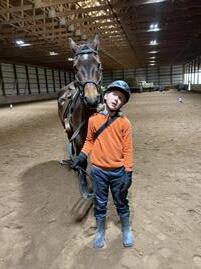
That’s the gist of us! There is so much more that there isn’t space for. I hope to inspire, support, and love every special needs family that crosses my path now and in the future. Links to my blog and book follow: https/www.growingexceptional.com/ https/www.archwaypublishing.com/ en/bookstore/bookdetails/811369growing-exceptional-seedlings (Also available on Amazon© and other online book retailers)
